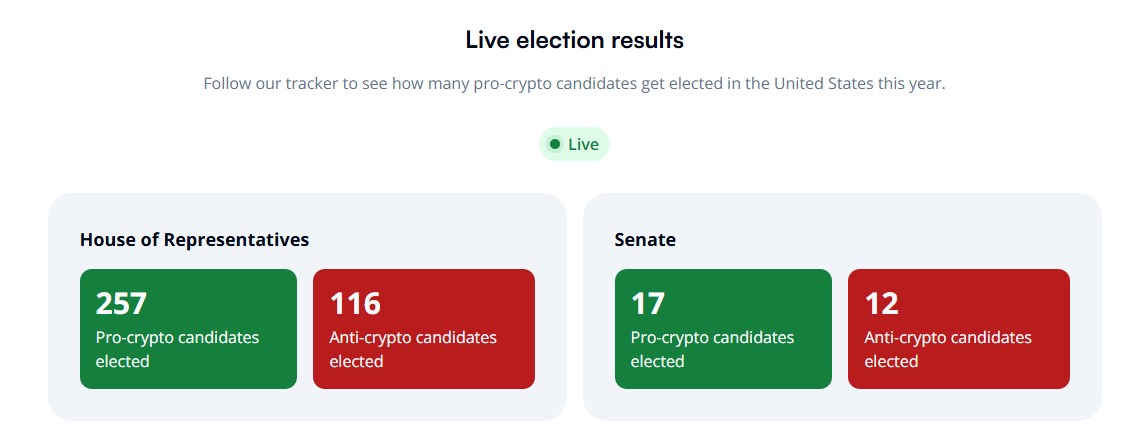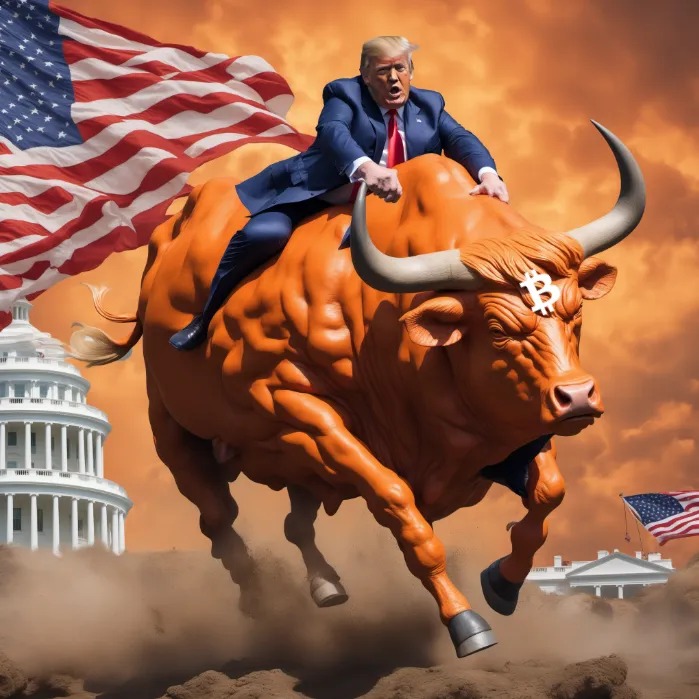As Trump clinched his second term, markets went ballistic. Bitcoin hit new all-time highs, Congress experienced a crypto-friendly shake-up, and prediction markets outshined the 24-hour cable networks.
Introduction
The 2024 presidential election is one for the history books, and if you’re in crypto, it’s one to remember with a smirk. As Trump clinched his second term, markets went ballistic. Bitcoin hit new all-time highs, Congress experienced a crypto-friendly shake-up, and prediction markets outshined the 24-hour cable networks we’re all tired of anyway. The election wasn’t just a political event; it was a full-blown financial frenzy. And as the world adjusted to this new era, the crypto market strapped in for the ride of its life.
Bitcoin’s Big Moment and a Meme Coin Mania
With Trump pulling away in the polls, crypto didn’t just rally—it went straight into overdrive. Bitcoin entered a state of price discovery, smashing past previous highs and rocketing over $75,000. Speculative coins also got their time in the sun; DOGE, in particular, went on an unexpected moon mission. Elon Musk’s previous endorsement of a proposed “Department of Government Efficiency” (DOGE, for short) sparked a surge for Dogecoin. The fact that Musk offered to “streamline” government operations in his typical tongue-in-cheek style only stoked the flames. Meme coins had never been so relevant—or profitable—as traders embraced this wild new wave of speculative excitement.

A Pro-Crypto Congress
The 2024 elections brought a seismic shift to Congress, where crypto-friendly candidates dominated the ballot. The industry pulled out all the stops, strategically investing hundreds of millions into key races to secure a pro-crypto majority. In Ohio, the high-stakes Senate race saw Defend American Jobs (DAJ)—a political action committee aligned with the largest pro-crypto super PAC, Fairshake—pour over $40 million into ads supporting Bernie Moreno, helping him secure a crucial win. This push was just part of the estimated $400 million in ad spending during the Ohio race, with crypto-backed funding representing a significant 10% of the total.
The success wasn’t confined to Ohio. DAJ’s influence extended to West Virginia, where the PAC dropped $3 million to help Republican Governor Jim Justice flip a key seat red after Democratic Senator Joe Manchin vacated it. Justice won in a landslide, garnering 69% of the vote against Democratic challenger Glenn Elliott, further tipping the scales in favor of crypto-friendly policy advocates.
The industry’s strategic spending continued to make waves in Indiana, where a $3 million injection helped Republican Jim Banks fend off Democrat Valerie McCray in a bid to replace GOP Senator Mike Braun. Banks clinched victory with 54% of the vote, a result that underscored the strength of the crypto industry’s influence in traditionally competitive races.
High-profile victories for pro-crypto incumbents, such as Democratic Senator Kirsten Gillibrand of New York and Republican Senator Ted Cruz of Texas, who each handily won re-election, further solidified crypto’s position in Congress. On both sides of the aisle, candidates who aligned themselves with blockchain innovation and financial reform found favor with the electorate, indicating a growing bipartisan consensus around crypto-friendly policies.
Despite these wins, crypto’s influence had its limits. Elizabeth Warren, one of the crypto industry’s most vocal critics, was re-elected in Massachusetts, defeating John Deaton, a class-action attorney and crypto advocate who had received over $2 million in industry backing. Warren’s victory highlighted that, while the industry’s financial support was strong, it could not sway voters in every district, especially in historically liberal areas wary of deregulation.
Crypto’s clout extended beyond individual races. A new data report from Stand With Crypto revealed that crypto-related funds benefited winning candidates across Arizona, California, Colorado, Iowa, New York, Michigan, and Virginia, with over $50 million channeled into these races. This year’s election also saw unprecedented support from high-profile crypto advocates. Major donations from industry giants like Marc Andreessen, Ben Horowitz, and the Winklevoss twins helped propel Trump’s campaign forward, ultimately contributing to his landslide electoral college and popular vote victories. These industry titans contributed a combined $10 million to Trump’s campaign, with overall donations from the crypto industry exceeding $22 million. Trump’s open embrace of crypto throughout his campaign—including a keynote address at the Bitcoin Conference where he promised to fire SEC Chairman Gary Gensler—made him the industry’s clear favorite. His firm stance against regulatory crackdowns positioned him as the ideal candidate for those hoping to see the U.S. establish itself as a global crypto powerhouse.
With a newly pro-crypto Congress and a supportive administration on the horizon, the crypto industry’s significant investment in this election may be the start of a new chapter. Regulatory reform, innovation-friendly policies, and fresh enthusiasm from pro-crypto legislators are setting the stage for a period of rapid expansion, giving crypto enthusiasts every reason to be optimistic about the road ahead.

Prediction Markets Outshine Traditional Media
In the 2024 election, prediction markets like Polymarket, Kalshi, and PredictIt made a definitive case for their relevance and accuracy. While mainstream media outlets and pollsters struggled with calls of “too close to call,” the prediction markets were crystal clear, showing Trump as the likely winner long before the final votes were tallied. For those glued to these real-time betting platforms, Tuesday night’s election wasn’t nearly as shocking as it was for those following traditional media. As the GOP’s unexpected success unfolded, Polymarket and its peers emerged as the champions of election forecasting, heralding a new era in political prediction.
Polymarket, the star player in this space, saw billions in trading volume over the election cycle, drawing attention not only for its accuracy but also for the skeptics claiming it was subject to pro-Trump manipulation. Yet, the results spoke for themselves: while pollsters were split, Polymarket held strong, giving Trump a 98.8% chance of victory by the early hours of Wednesday morning. In contrast, traditional polls leaned towards Kamala Harris, even suggesting the race could be slightly in her favor.

Even the New York Times “election needle,” known for its sober analysis, began showing Trump with a 95% chance of victory by 1:25 a.m. ET, while Polymarket users had already reached this conclusion. The swift, decisive calls from prediction markets stand in stark contrast to the traditional media’s more cautious approach, sparking widespread interest in their reliability for future political events. Looking ahead, prediction markets are poised to transform not just election forecasting but the entire landscape of political analysis, where real-time data may soon eclipse punditry as the ultimate source of truth.
What’s Next: Crypto Deregulation, Silk Road Pardons, and the U.S. Bitcoin Reserve?
With Trump’s return to office, the crypto industry is poised for a major shift, beginning with potential changes at the top of key regulatory agencies. Trump has openly criticized the SEC’s current approach and hinted that he would replace Chairman Gary Gensler, whose tenure has been marked by a tough stance on crypto firms. This change could ease the regulatory heat that has discouraged companies from building in the U.S. and could make the country a more attractive hub for blockchain innovation. Without Gensler at the helm, companies that have faced lawsuits and crackdowns may finally have the space to innovate without fear of punitive action, encouraging developers and entrepreneurs to re-engage with the U.S. market.

Trump’s support for crypto doesn’t stop at regulatory reshuffling. He has also pledged to pardon Ross Ulbricht, the founder of the Silk Road marketplace, a move that would resonate deeply with decentralization advocates and the broader crypto community. This promise signals Trump’s willingness to reconsider the punitive approach previously taken against those who challenge traditional financial systems, which could further embolden blockchain developers in the U.S. to push the boundaries of decentralized technology.
Speculation is also building around Trump’s potential cabinet choices, with names like Howard Lutnick—CEO of Cantor Fitzgerald and an outspoken crypto proponent—rumored to be in the running. Bringing in figures like Lutnick could mean more than just symbolic support; it could lead to policies that actively integrate digital assets into the U.S. economy. In one of the more ambitious moves being floated, Trump might even explore the idea of a U.S. Bitcoin Reserve. Such a development would be monumental, signaling an official acceptance of Bitcoin as a strategic asset and potentially encouraging other countries to consider similar moves.
Bitcoin mining stocks are already on the rise in anticipation of pro-mining policies from the new administration. Trump has suggested he would prioritize the domestic mining of Bitcoin, which could lead to tax incentives or even a new tax framework for miners, such as deferring taxes on mined Bitcoin until it is sold. These potential changes could spark a mining boom in the U.S., creating new jobs and making the country one of the leading Bitcoin-producing nations.
While the post-election rally has propelled meme coins like DOGE, there’s growing anticipation that deregulation will usher in a strong wave of interest in utility coins—assets that have real-world applications beyond speculation. Utility tokens with established use cases and even revenue streams have been constrained by regulatory uncertainty, which has limited their growth and value distribution to holders. With the prospect of regulatory relief, these coins could finally have the freedom to realize their full potential, paving the way for a new altcoin season reminiscent of the 2017 and 2021 rallies. This next phase might see investors shifting focus from meme coins to tokens with solid fundamentals, as confidence grows around a more permissive regulatory environment.
Ultimately, a pro-crypto administration combined with easing interest rates and a more favorable regulatory climate could set the stage for a powerful bull market. If these changes materialize, the next few years could see the U.S. emerge as a global leader in the crypto space, solidifying its role as a key player in blockchain innovation.
Conclusion
The 2024 election might just be the catalyst that was needed to set off a raging bull market for crypto. With Bitcoin’s four-year cycle aligning perfectly with the changing political climate, more pro-crypto leaders in office, and an easing of interest rates, the market is practically overflowing with potential. Investors can feel the winds of a new crypto era blowing, and it’s going to be quite a ride. Hold on tight—this bull run is just getting started!
Resources:
This is a sea change moment for digital assets:
— Felix Hartmann (@FelixOHartmann) November 6, 2024
– We have a pro-crypto legislative branch
– We have a pro-crypto executive branch
– We have ousted the Anti-crypto head of the senate banking committee
– We have cleaned our own house in 2022 with the FTX collapse and lending…
Trump white house + republican senate = unambiguously bullish for crypto. Biggest winners are those altcoins with strong fundamentals (and even large cash flows) that haven't been able to monetize or distribute value to tokenholders due to regulatory constraints. Macro – we're…
— Ari Paul ⛓️ (@AriDavidPaul) November 6, 2024
Honestly wild: pic.twitter.com/OfPJFI29nc
— Chris Bakke (@ChrisJBakke) November 6, 2024

